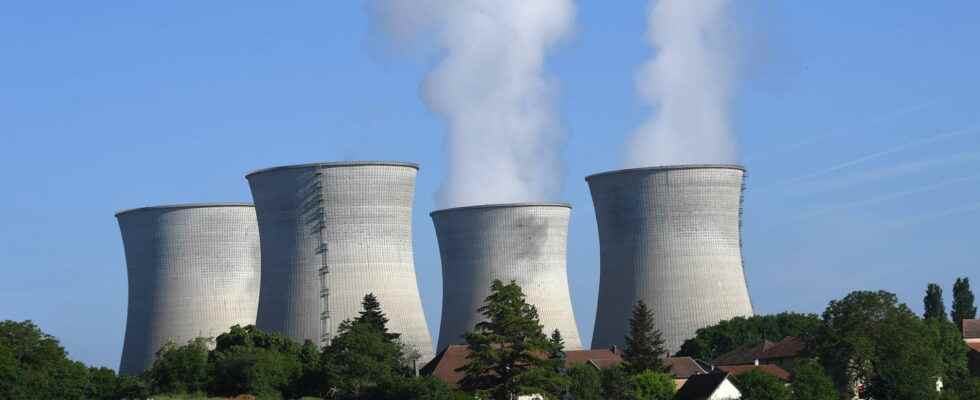Elisabeth Borne announced this Wednesday to the Assembly the intention of the State to “hold 100% of the capital of EDF”. What could this nationalization change?
[Mis à jour le 6 juillet 2022 à 22h36] “I confirm to you today the intention of the State to hold 100% of the capital of EDF”, announced Elisabeth Borne during her speech on general policy, this Wednesday afternoon at the National Assembly. In other words, the State is preparing to nationalize the first producer and supplier of electricity in France. Or rather, to renationalise it, because the capital of the company was 100% owned by the State until 2005. This announcement did not come out of nowhere: already on June 14, on Europe 1, the Minister of energy transition, Agnès Pannier-Runacher, declared that the nationalization of EDF was “not excluded”, justifying: “It is a project which will allow us to accelerate on renewable energies, but which will also allow us to ‘accelerate on nuclear, because we must not fall behind’. This news was not necessarily well received by the unions. “EDF’s problems are above all under-capitalization and under-remuneration. It is not because we are renationalizing that we are strengthening EDF’s equity structure, it does not solve its structural financial problem “, said Alexandre Grillat, of the CFE Energies Federation, following the announcement.
What would a nationalization of EDF actually change? Let us first recall that the State already owns 84% of the company’s capital. It should also be remembered that the company is experiencing major financial difficulties. “This development will enable EDF to strengthen its capacity to carry out ambitious and essential projects as soon as possible for our energy future”, developed Elisabeth Borne before the deputies. The aim would therefore be for the State to give the electricity producer the orientation it wishes and to invest massively in the energy transition. According to the previous declarations of Agnès Pannier-Runacher, it would be a question of developing renewable energies, but above all of carrying out the development project of six new EPR power plants, that is to say developing the nuclear energy. “The energy transition goes through nuclear power”, confirmed Elisabeth Borne to the Assembly this Wednesday, July 6.
However, things might not be that simple. Because this is not the first time that Emmanuel Macron has been tempted to nationalize EDF. During his first mandate, the executive had already worked on the “Hercule” plan (then “Grand EDF”), the aim of which was to split EDF into three separate companies: blue EDF, concentrated on nuclear energy, EDF green on renewables and EDF azur on hydraulics. The state intended to nationalize EDF bleu and open the other two to competition. This project, rejected by the opposition, the unions and the European Commission, which feared a state monopoly, was finally abandoned in the summer of 2021. What will the executive’s plan be this time around? If we stick to what Agnès Pannier-Runacher said in June, it is no longer a question for the State of separating from the renewable subsidiary, but of developing it in parallel with nuclear power.
What is the history of EDF and the French State?
Elisabeth Borne therefore announced, on Wednesday July 6, 2022, the “renationalization” of EDF. We are not talking about nationalization since the company was previously under the control of the French State. To fully understand, we have to go back to the aftermath of the Second World War. The government then considers that it is necessary to nationalize gas and electricity. It is in this context that the law of April 8, 1946 was adopted. Electricity of France. Nationalization was then intended to straighten out the French economy, modernize existing structures, rationalize efforts, become energy independent and have control over the country’s strategic orientations. We have to wait until the beginning of the 21st century to see EDF change status, in the context of the opening of the electricity market to competition. It became a public limited company in 2004, but the State still retained 84% of the company’s shares.
How much would the nationalization of EDF cost the State?
The State already holds 84% of the capital of the company, let us remember. Therefore, according to European 1, its complete nationalization would only cost it between five and six billion euros. On the other hand, EDF is currently experiencing economic difficulties and is heavily indebted. In the medium term, the State should therefore invest a great deal in the company. Especially since the government’s project to build six EPR plants in the coming years is estimated at 60 billion euros by Agnès Pannier-Runacher. Note, however, that since the announcement of Elisabeth Borne of a nationalization in the Assembly, this Wednesday afternoon, the course of EDF on the stock market has suddenly taken off.
